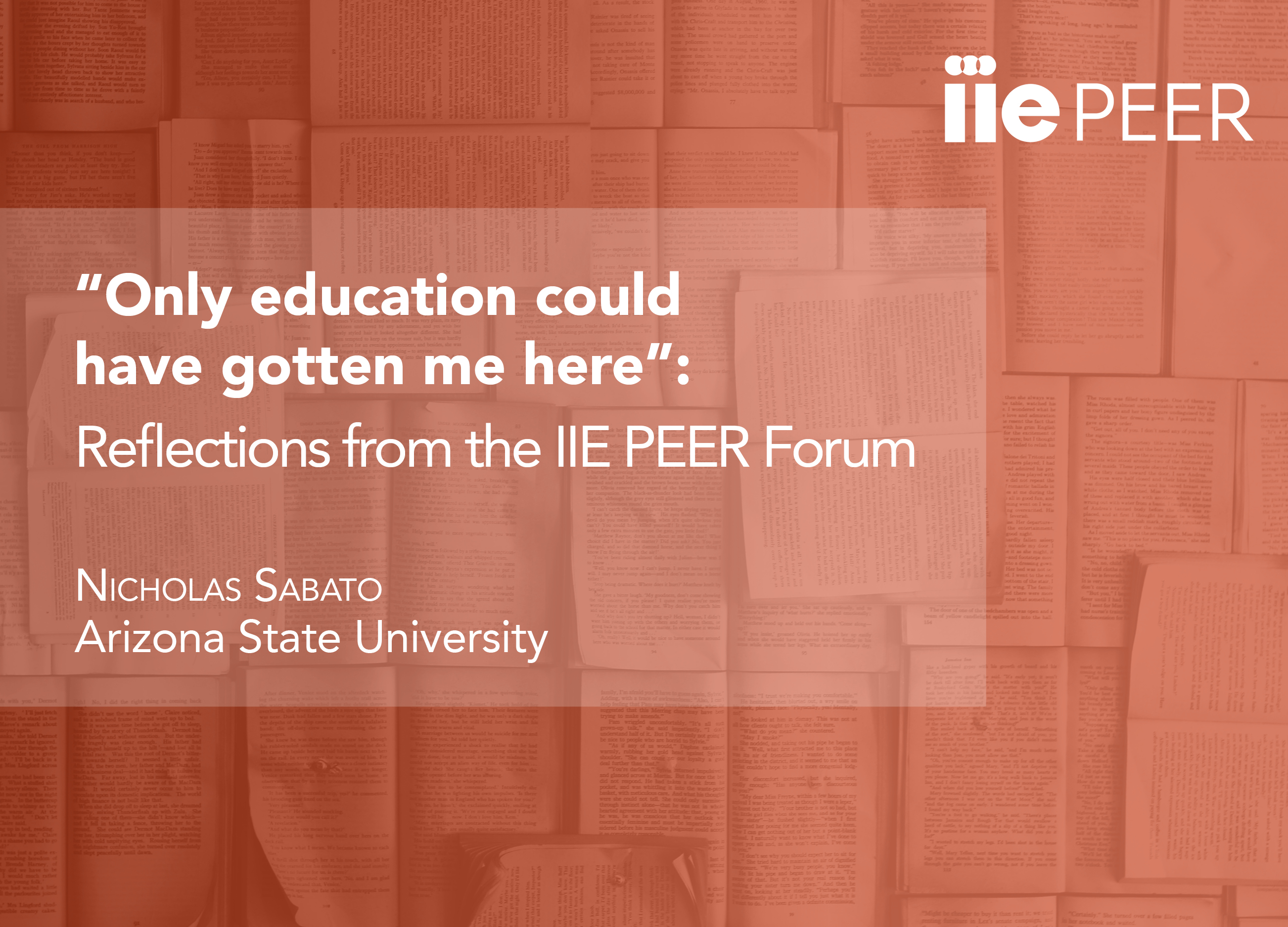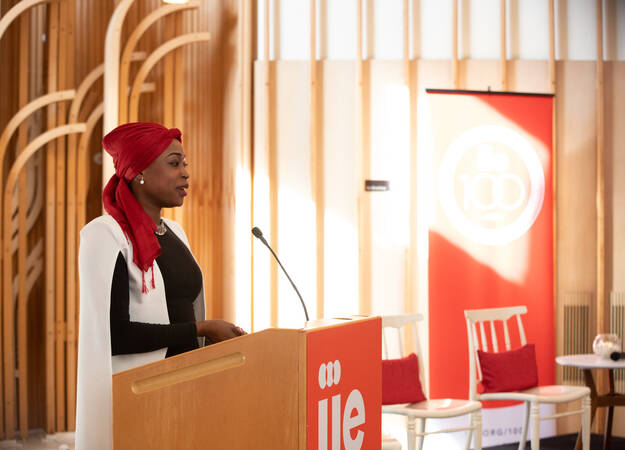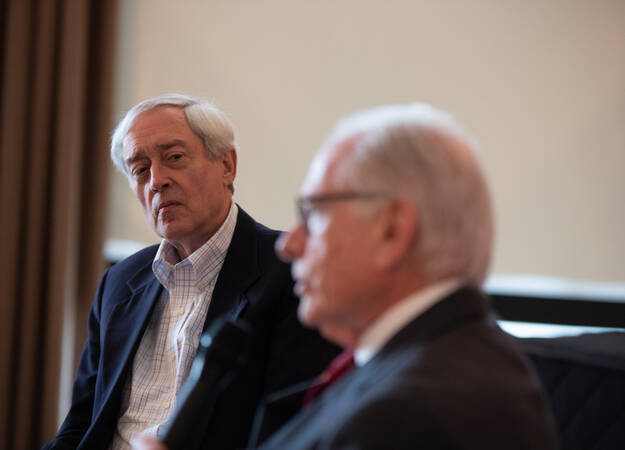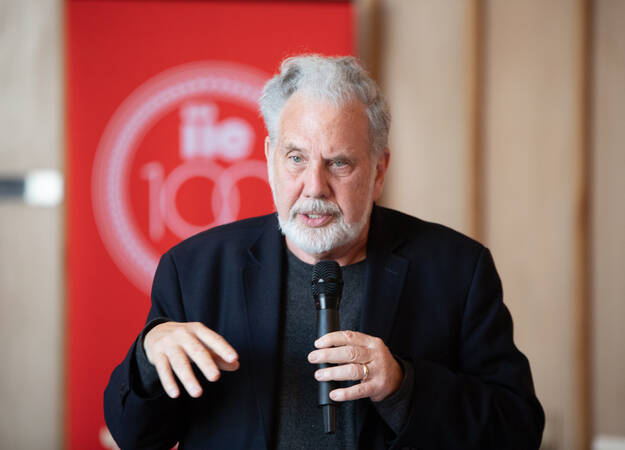
As the early spring sunlight shone through the 12th floor windows at IIE’s New York headquarters, the hum of conversation steadily grew. New acquaintances introduced themselves and old friends continued conversations that began perhaps half a world away. The excitement was palpable; the inaugural IIE PEER Forum was about to get underway and the room was filled with multi-sector stakeholders all keen on contributing to the effort to provide equitable access to education for displaced learners.

The tone for the day was set immediately through the words of Ekhlas Ahmed, keynote speaker and educator, activist and delegate to the Refugee Congress. She shared her personal story as a refugee, commenting on the various challenges and opportunities that she encountered in her journey from Darfur to Maine. Amidst an array of powerful anecdotes, one line echoed the banquet hall with particular intensity: “Only education could have gotten me here.”
Heads began nodding throughout the room, signifying the tacit understanding of the transformative nature of education. Her assertion became the punctuating thread of the Forum; the acknowledgement not only of the power of education but the responsibility of those present to extend this opportunity to others.
While still reflecting on Ahmed’s moving testimony, I eagerly flipped through the day’s agenda to find a comprehensively constructed slate of discussions that were both refugee-centered and representative of perspectives from across the refugee education sector. Amplified by the diversity of discussant backgrounds, the underlying message was resounding and reflective of the IIE ethos: the means for achieving impact are through shared responsibility.

In the afternoon’s “Fireside Chat” with IIE President Allan Goodman, Dr. George Rupp, President Emeritus of the International Rescue Committee (along with Rice and Columbia universities) noted that current efforts, as laudable as they may be, are a “drop in the bucket”. The key for the modern American university to assist displaced learners, as noted by Dr. Rupp, is “a more localized solution, supporting students where they are”.
Dr. Rupp’s assertion complemented a statement made earlier by Salim Salamah, an Education in Emergencies consultant, recommending that rather than only taking refugee students on campus, we “take university opportunity to refugees where they are currently”. Having come from Yarmouk camp in Syria to achieve a graduate degree at Oxford, few are in a better position than Salim to understand the harrowing educational journey many refugees face. "By taking the university to the camps, this gives refugee students the sense of community and solidarity they long for, and especially the sense of normalcy."
There is comfort to be taken in the alignment between these astute observations and the efforts currently being taken by IIE and partners. As noted by IIE Southeast Asia Regional Director, Dr. Jonathan Lembright, stakeholders are increasingly developing innovative partnerships that address barriers to entry and utilize technology as a mechanism to extend this access. IIE is partnering with Arizona State University, for example, in utilizing connected learning to offer degree pathways to refugee learners in the Asia-Pacific region, one of a number of connected learning efforts that are providing opportunities for learners around the globe.

With an endearing display of candor that only he could convey, John Sexton, President Emeritus of NYU, closed the day with an inspirational testimony to the power of education and an encouraging call-to-action. Sexton noted that the extension of education to displaced individuals is not a question of “charity”, but rather our responsibility to “fight the good fight for the benefit of everyone.''
His closing punctuated our communal responsibility, underlining confirmation of both the complexity of offering tertiary education to displaced individuals but also the immense impact that such an audacious effort can yield, as evidenced by the individuals in the room.
After all, as put most succinctly by IIE President Allan Goodman, “if you connect someone back to education, they thrive.”
Nick Sabato
Director of Country Programs
Education for Humanity
Arizona State University
@ASUed4humanity
Credit: All photographs by Steven Rosen Photography | http://www.stevenrosenphotography.com

